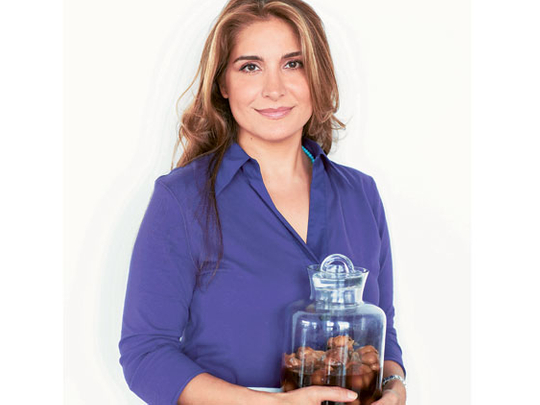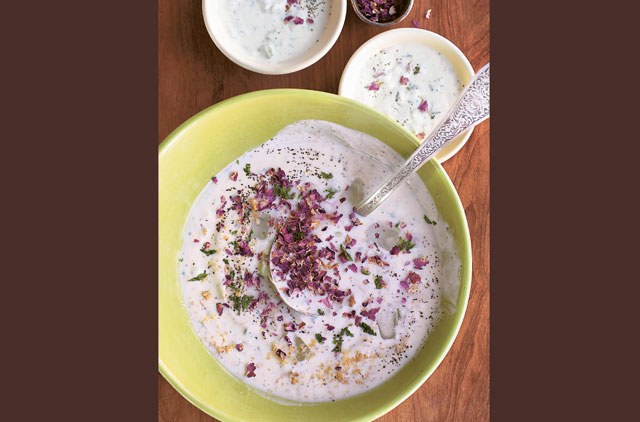
When I think of Iranian food, it's kebabs and rice that spring to mind. Speak to chef Ariana Bundy, however, and the cuisine takes on a magical quality.
Read her new cookbook, Pomegranates and Roses, and it becomes almost mythical, as she describes feasts scented with roses and saffron; fields of rice swaying in the breeze, the Caspian Sea in the distance; horse rides between far-flung villages; and a delicate balance of hot and cold qualities said to soothe body and mind.
Cookbooks are, after all, as much for inspiration as for practical cooking purposes, something clearly on Bundy's agenda when she decided to reflect back on her Iranian heritage for her second volume, following the success of her dessert cookbook Sweet Alternative.
"It wasn't the book I wanted to write," Bundy said on the sidelines of the recent Emirates Airline Festival of Literature in Dubai, where she launched Pomegranates and Roses. "I wanted to write something more modern, but it seems like the Western idea of Iran is so romantic, and my editor said we want to put romance back in. I said, ‘you want romance, I'll give you romance!'"
Follow to the ‘t'
Bundy was born in Iran but left as a child, growing up in the United Kingdom and then the United States, where she rose to the position of pastry chef at the Mondrian Hotel in Los Angeles. As a pastry chef, she's strict about measurements, timings and ingredients. As an Iranian, she's got the desire to share the magic of her oft-misunderstood nation. Put the two together and you get authentic Iranian food for the cookbook generation.
"Iran is a nation of really good cooks, so it's very daunting," she says of the project. "I wasn't brought up cooking food like that, so I looked at Iranian food as a chef. I wanted to dissect it, I wanted to know how it was done, because the recipes I was given by my relatives they were ‘a little bit of this and a little bit of that'. When I made recipes with them, I would have my cups and my scales, and I'd turn my back and they had put something in [the dish]. I really wanted to make it my mission — for example the rice recipe, someone would tell you, boil the rice, layer it, steam it and it's done. I wanted to know, exactly when am I supposed to take it off the fire? When is it al dente? When am I supposed to steam it?"
Delicate yet comforting
Rice and kebabs, are, of course, integral to Iranian cooking, but what I learnt from Bundy's book is the important balance of spices and flavourings.
"It's delicate, refined, yet comforting," she says. "There are lots of delicate flavours, but using ordinary ingredients — potatoes, beans, carrots, courgette, eggplant, mixed together — for example an orange peel and carrot dish with rose water and pistachios, or a pomegranate and walnut stew. Iranians feel very proud of the quality of their meat and fruits and vegetables and we don't want to mask it, so have a very delicate hand when you are using spices such as cinnamon, rose petals, turmeric and saffron, which is the king of Persian spices."
Every nation seems to have a version of chicken and rice, and Iran's answer is zereshk polo. Polo means cooked rice, while zereshk are bilberries, the tiny dried red currants that add a sweet and tart note to the buttery rice and make the dish unmistakably Persian. "It's my son's favourite food," laughs Bundy. "It's so simple and he loves it so much that he does a little dance [which she re-enacts]. Iranian food is so tasty to children because it's comforting; it's different but not foreign."
Sweet-sour fruits in savoury dishes are common from Morocco to India, but in Iran it's taken to a whole new level: in Pomegranates and Roses, the fruit chapter includes mostly savoury dishes, featuring the ruby pomegranate in many forms, as well as cherries, quince, orange. Fruit is celebrated, writes Bundy, and is eaten in its natural form, "most often chilled", conjuring up images of piles of cool cherries and sour unripe plums. Seasonality and the concept of hot and cold (called unani) in food are also characteristic, says Bundy; she dedicates a number of pages to explaining garmi and sardi — "Iran's answer to yin and yang". But we are not talking temperature here. Each food has its own cool or warm qualities, and they have an effect on the body.
"It balances the cuisine," she says. "So that stew of pomegranates and walnuts is a perfect balanced meal, walnuts being hot, pomegranates being cold. It is served in winter because it's hot [the dish] and pomegranates are in season."
At the other end of the scale is the cooling mast o khiar, the recipe for which follows. "It is cooling, but it has walnuts and certain herbs which are hot," she says. Once an individual's constitution is identified, foods can be eaten to alleviate illness. "There are herbal centres where if you are too hot they can give you different waters such as mint water and dill water to cool you down," adds Bundy.
Bundy has a warm, easy manner of speaking; when we meet in a busy conference room at the festival, she is munching on bourbon biscuits and passing them my way. But after about 15 minutes, she begins to speak a little louder.
"That lady is Iranian," she says pointing to someone leaving the room, "and I was afraid she might turn around and say ‘that's not true'. You get intimidated by all the Iranian women because they knew exactly what they are doing."
But she is clearly very experienced, I venture.
"I'm sure she can't do what I do in the kitchen, but it takes years to get your own signature and be confident about it. It's a lot of tricks to make sure the stew is settled in, there are signs to when it's time to do the next step."
The book, however, has the blessing of many Iranian women, her mother included, so I put her worries down to book-launch jitters. "My mum is the stylist of the book," she says. "I got recipes from her, my grandmother, my great aunt, staff that have been with us for 60 years. They actually approve totally."
In black-and-white
The book is divided into ingredients rather than courses, with fruits and vegetables, rice, meat and fish as chapters, interspersed with accounts of her family's life in Iran before the revolution.
Black-and-white images enhance the stories and, after speaking to her, Bundy's love of cooking seems secondary to her hunger for Iran.
"I wrote this book as a longing for Iran. I would remember all those sights and sounds I really missed when I was eating beans on toast in London," she says."I wanted to recapture that era of my grandparents' world, when 30 cousins would go horseback riding from one village to the other, having a barbecue. I don't know how I'm going to recreate it for my son, but I just wanted to get it on paper. These are recipes everyone grew up with, everyone has memories with. I am hoping these stories and memories are shared by other Iranians who want to share with other people and say ‘this is my culture! This is my food.'"
Mast O Khiar: Cold cucumber soup with plum raisins, walnuts, mint and spring onions
Iranians eat a lot of cucumbers. They're considered more of a fruit than a vegetable and eaten as such. The cucumbers in Iran are small, juicy and packed with flavour. When you bite into one, the smell fills the whole room. At parties, they're piled high, with some rock salt on the side for sprinkling.
This yoghurt and cucumber soup is an example of a perfectly balanced "hot" and "cold" dish: "cold" yoghurt is mixed with "hot" walnuts and raisins, with fresh herbs for easy digestion.
Here, I've used different types of yoghurts to mimic the texture and slightly sour taste of yoghurt made in the villages of Iran. You can also use just natural full-fat or even fat-free yoghurt, mixed with a teaspoon of lemon juice. One of my best foodie friends Maryam Samiy uses champagne grapes instead of raisins, which adds a whole new dimension to this dish.
- 1 large cucumber, semi-peeled, seeded and diced or 6 small cucumbers, diced
- 400ml (1 and 1/2 cup) low-fat Greek yoghurt or crème fraîche
- 200ml (3/4 cup) full-fat natural yoghurt
- 200ml (3/4 cup) soured cream
- 50g (1/2 cup) raisins
- 4 tbsp roasted walnuts, chopped
- 1 tbsp chopped fresh mint
- 1/2 tsp dried mint
- 3 tarragon sprigs, finely chopped
- 2 spring onions, finely chopped
- 1 tsp sea salt
- Fresh pepper, to taste
- 1 tsp dried rose petals, for garnish
Mix all the ingredients except the rose petals together in a large bowl. But if preparing in advance, add the cucumbers at the last minute so that they stay crunchy and don't give out too much juice. You can also slice the cucumber first, sprinkle with salt, leave for an hour in a colander, run under the tap to remove the excess salt, dry the slices and then dice them. They'll be extra crunchy and will not go limp the next day in case you have any soup left over.
Sprinkle the soup with rose petals and serve in individual bowls. On a hot day, add a few ice cubes.
Excerpted from Pomegranates and Roses
Pomegranates and Roses: My Persian Family Recipes (Simon & Schuster UK) is available now in Kinokuniya and Magrudy's, RRP Dh150.













